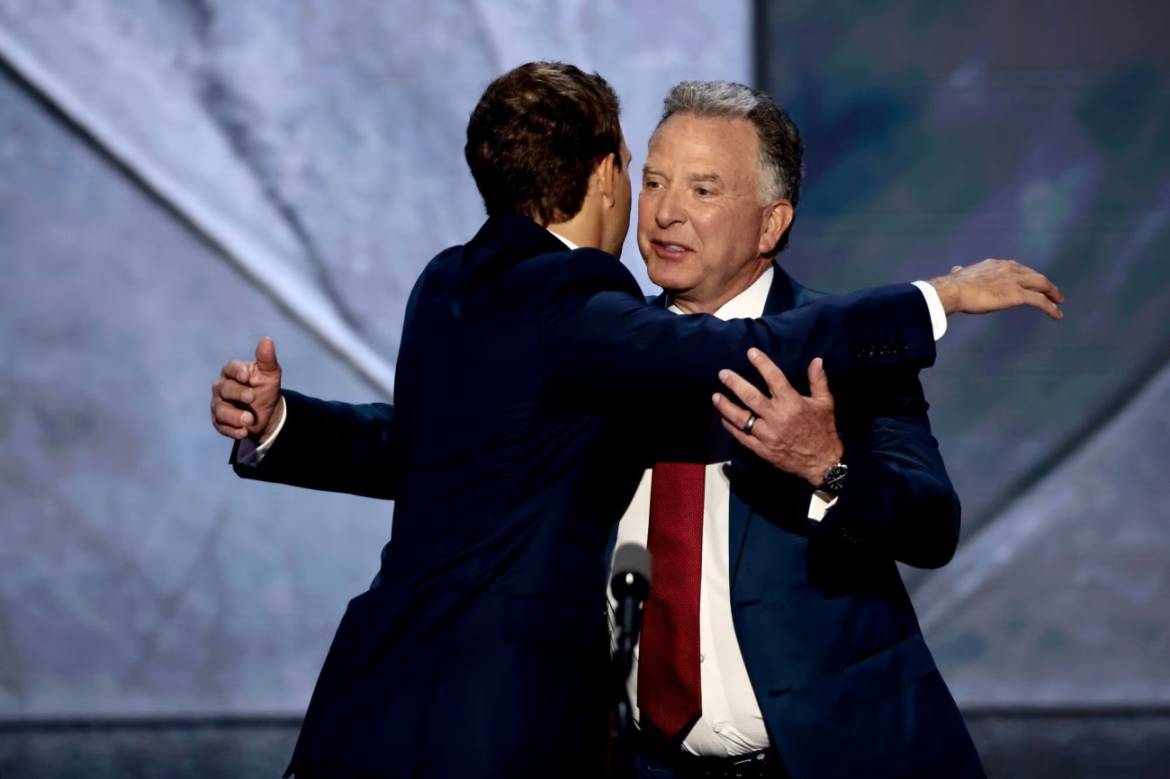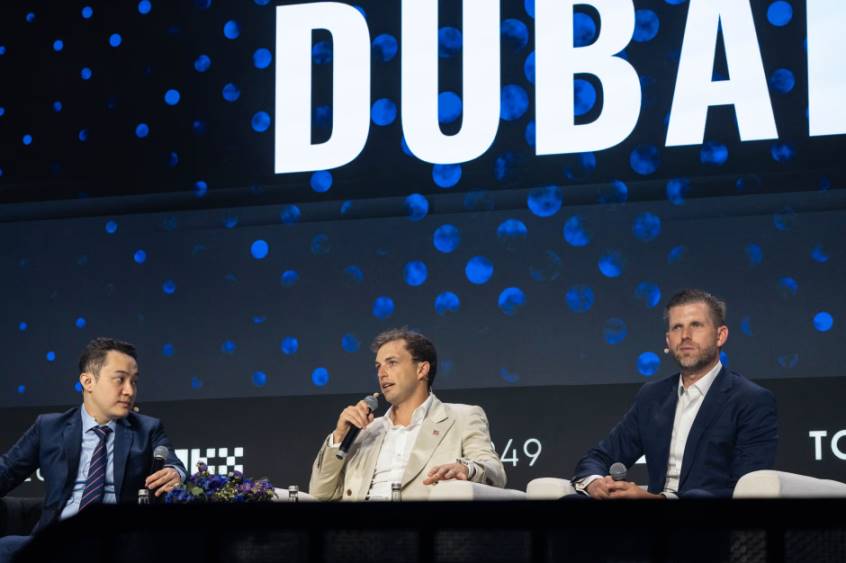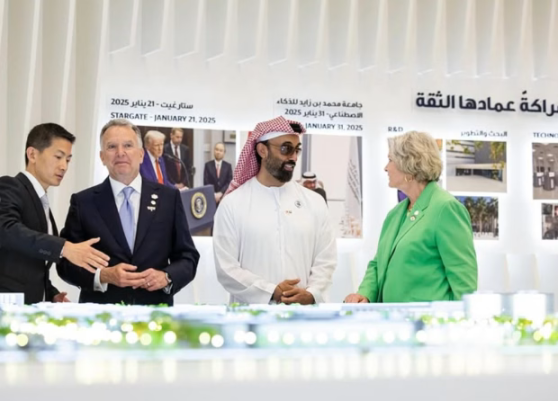Steve Witkoff's son Zach is promoting overseas trading for World Liberty Financial.
Written by: Rebecca Ballhaus, Angus Berwick, The Wall Street Journal
Translated by: Luffy, Foresight News

In July last year, Steve Witkoff and his son, crypto entrepreneur Zach Witkoff, at the Republican National Convention. Photo source: Bloomberg
One month before President Trump’s inauguration, Middle East envoy Steve Witkoff flew to the UAE with two goals: to discuss regional issues with Abu Dhabi royal family member Tahnoon bin Zayed al Nahyan and to attend a cryptocurrency conference.
Less than five months later, Witkoff's son, Zach Witkoff, co-founder of crypto company World Liberty Financial, announced at a conference in Dubai that the company had reached an agreement with Tahnoon’s business, which would purchase $2 billion worth of cryptocurrency issued by World Liberty. The Witkoff father-son duo and the Trump family (note: the Trump family holds 60% of World Liberty Financial) are expected to share tens of millions of dollars in annual profits.
On May 15, the elder Witkoff met with Tahnoon again, this time to unveil a long-sought agreement by the UAE: to acquire millions of advanced American-made computer chips for the oil-rich Gulf monarchy.
68-year-old Steve Witkoff is a longtime friend of Trump and has been traveling the globe handling diplomatic affairs since taking on the envoy role. Meanwhile, his 32-year-old son Zach Witkoff and his advisory team have traveled to at least four countries to advance efforts aimed at making World Liberty Financial an industry leader in crypto trading.
The parallel dealings of this father-son duo in the UAE vividly illustrate how World Liberty Financial's business efforts intertwine with government affairs.
According to insiders, Zach Witkoff compared Trump to "the Godfather" during promotional calls with crypto companies, stating that World Liberty would fully leverage the increasingly friendly changes in U.S. crypto regulatory policies. His posts on the X platform frequently mention his father's work for the White House.
The intertwining of government negotiations and private business deals is rewriting diplomatic rules for some countries trying to establish connections with Trump’s new administration. The actions of Trump affiliates, including the Witkoff father-son duo, seeking business opportunities in the Gulf since Trump took office have not been previously reported.
Insiders and photos and videos of meetings posted on social media show that some countries seeking to advance their own affairs have not only hired American lobbyists and sent delegations to Washington to improve relations with Trump’s White House but have also met with family members and friends of U.S. officials. For example, a senior finance minister from Pakistan met with the sister-in-law of U.S. Defense Secretary Pete Hegseth and the 19-year-old son of Donald Trump Jr. to discuss digital asset issues.

On May 1, World Liberty Financial co-founder Zach Witkoff (center), crypto entrepreneur Justin Sun (left), and Trump’s second son Eric Trump (right) attended the cryptocurrency conference Token2049 held in Dubai. Photo source: The Wall Street Journal
White House Deputy Press Secretary Anna Kelly stated that Steve Witkoff is divesting his assets, including World Liberty, and that he does not hold any "operational role" in the company and will not discuss company or personal matters while serving in government. She noted that Trump is "immensely proud" of Steve's achievements. Witkoff does not receive a government salary and travels the world on a private jet, and his financial status has not been publicly disclosed. He has stated that he will transfer all assets to his sons.
World Liberty spokesperson David Wachsman stated that the company's business dealings are unrelated to the U.S. government, and the company "does not even have the capacity to discuss official government matters." He added that "it is incorrect to characterize the meeting between World Liberty and Ambassador Witkoff in the same country as some sort of conflict of interest," and emphasized that "there is no connection between the two."
He denied that Zach Witkoff referred to Trump as the Godfather, pointing out that Witkoff is Jewish and has no Godfather.
The Trump Organization, the real estate company of the Trump family, has pledged not to enter into new deals with foreign governments during Trump's presidency. World Liberty has not made such a commitment.
Before venturing into the cryptocurrency space, Zach Witkoff served as a project manager at his father's New York real estate firm, Witkoff Group. In 2020, he took over the family office and, according to his LinkedIn profile, "focused on blockchain." He, along with his father and others, founded World Liberty in September, just seven weeks before the presidential election.
World Liberty issued a cryptocurrency called USD1, pegged to the U.S. dollar, aimed at helping businesses and individuals transfer funds across borders outside the banking system. According to individuals who have worked with the company, it has marketed its tokens to foreign governments eager to improve relations with the U.S.
In addition to meetings between World Liberty and UAE officials, Zach Witkoff also met with several senior government officials in Pakistan, who weeks later negotiated a ceasefire with the Trump administration regarding India. He told them that World Liberty could "tokenize" the buying and selling of Pakistan's rare earth minerals using blockchain technology. Meanwhile, according to a lobbyist working with Pakistan on the agreement, Pakistan has been negotiating with the U.S. on a potential rare earth and other mineral deal worth trillions of dollars.
World Liberty's spokesperson stated that the meetings held in Pakistan are "unrelated to any agreements Pakistan may be negotiating with the Trump administration."
Zach Witkoff's advisors and colleagues have also met with the foreign minister and prime minister of Malaysia, as well as the president of Kyrgyzstan, and spoke at a cryptocurrency conference in Moscow attended by the deputy finance minister of Russia.

Steve Witkoff (second from left) met with Sheikh Tahnoon bin Zayed al Nahyan (second from right) in Abu Dhabi this month. The photo was posted on Sheikh's Instagram account.
Binance founder Changpeng Zhao has made some introductions for World Liberty's overseas ventures. In 2023, Zhao and Binance acknowledged violations of U.S. anti-money laundering laws. Zhao has been seeking a pardon from the Trump administration, hoping to return his company to the U.S. market and to terminate compliance requirements imposed after reaching a settlement with the Department of Justice. World Liberty's spokesperson stated that Zhao and Zach Witkoff are friends, but Zhao is not a mediator.
A Binance spokesperson stated that Zhao has been promoting "global innovation" in the cryptocurrency industry, and the company is "proud to help the U.S. become the global cryptocurrency capital."
World Liberty has not publicly disclosed its token buyers, but it has raised over $550 million through token sales this year. Buyers whose purchases have been disclosed include DWF Labs, a cryptocurrency trading company based in Abu Dhabi, which bought $25 million worth of tokens; and Justin Sun, a China-born cryptocurrency entrepreneur who invested $75 million and currently serves as a company advisor. On Thursday night, Sun attended a cryptocurrency-related dinner as a guest with Trump.
According to insiders, the World Liberty team has negotiated potential symbolic purchases with other companies in the Gulf region, stating that such deals could aid its expansion plans in the U.S. World Liberty's spokesperson denied the claim that such deals could assist its expansion plans in the U.S.
Since Trump took office, he has been working to weaken government regulation of the cryptocurrency industry. The U.S. Securities and Exchange Commission (SEC) has dropped more than a dozen cases against cryptocurrency companies, including one against Justin Sun, who is known to be the largest external investor in World Liberty.
World Liberty's business is thriving. Thanks to its collaboration with the UAE, USD1 became the fifth-largest stablecoin by market capitalization just one month after its launch. Binance listed USD1 for trading on Thursday, which may boost demand for the token.
"This is just the beginning," Zach Witkoff posted on X in May.
Cryptocurrency Connections
Weeks after Trump won the 2024 election, longtime friend from the New York real estate circle Steve Witkoff embarked on a trip to the Middle East. According to insiders, shortly after Trump's victory, he was appointed as Middle East envoy and expressed to Biden administration officials his desire to start rebuilding connections in the region.
During his time in Abu Dhabi, Witkoff attended a cryptocurrency conference and privately interacted with other crypto entrepreneurs who later became key figures in World Liberty, including Justin Sun and Changpeng Zhao. Witkoff told attendees that cryptocurrency would rapidly develop under Trump’s administration.
Zach Witkoff was not present at the time, as his wife was giving birth. They named their son Don, after the president. He and his brother Alex have taken over World Liberty.
According to The Wall Street Journal, the father, Steve, who was not familiar with crypto technology at the time, was involved in negotiations between Zhao's cryptocurrency exchange Binance and representatives of the Trump family. Both Witkoff and Zhao denied participating in the negotiations.
As Trump's inauguration day approached, some countries began exploring new ways to establish connections. During Trump's first term, relations between Pakistan and the U.S. were tense, with the U.S. suspending $300 million in military aid to Pakistan in 2018, and Trump repeatedly accusing the country of not doing enough to combat militant groups.
In early January this year, Pakistan hired American lobbyists to assist in arranging meetings in Washington during Trump's presidency, where the Pakistani Interior Minister called for more American investment.
In late January, Texas financier and friend of Donald Trump Jr., Gentry Beach, led a delegation of investors to meet with Pakistani Prime Minister Shehbaz Sharif and his cabinet, expressing hopes to invest billions of dollars in luxury real estate and Pakistan's mineral sector (rich in lithium and other rare earth minerals). Earlier that month, at an event at Mar-a-Lago, Beach boasted that after Trump's victory, he gained opportunities to engage with foreign government leaders. "They treat me like President Trump," he said.
Beach's 20-year-old son, Gentry Beach Jr., met with Pakistan's Finance Minister Muhammad Aurangzeb (a former JPMorgan executive) in Islamabad in February to discuss opportunities for developing the crypto industry in Pakistan. The Pakistani Finance Ministry views cryptocurrency as a means to attract cautious foreign investors and revitalize the sluggish economy.
Joining Beach Jr. at the meeting were a sheikh from Dubai, a Russian tech executive, and a co-founder of the crypto project IslamicCoin. Beach stated that his son did not know the other attendees and never represented himself as associated with the U.S. government.
Another American with ties to the Trump administration also attended the meeting: Keli Whitlock, Chief Business Officer of an American blockchain company. His sister is married to U.S. Defense Secretary Hegseth.
An insider revealed that Pakistani officials do not consider Beach to be a suitable candidate to help Pakistan become a regional cryptocurrency leader. The Finance Minister ordered the establishment of a national cryptocurrency committee to oversee the drafting of cryptocurrency regulations, hoping to attract investors. He appointed Pakistani tech entrepreneur Bilal bin Saqib to lead the committee; Saqib had attended Binance's yacht party in Abu Dhabi last December and participated in a cryptocurrency conference in the UAE attended by Steve Witkoff.
Pakistan's Outreach
Pakistan has reason to expect improved relations with the Trump administration. In late February, the U.S. government exempted $397 million in security assistance to Pakistan from the foreign aid freeze list. Trump expressed gratitude in his State of the Union address for Pakistan's assistance in capturing a terrorist, which pleased Pakistani officials.
Lobbying records show that in April, Pakistan signed an agreement to pay $200,000 per month to Trump's former bodyguard Keith Schiller and former Trump Organization chief lawyer George Sorial, hiring them as consultants to help the country establish a "long-term economic partnership" with the U.S., particularly in the rare earth and critical minerals sectors.
Around the same time, Binance's Changpeng Zhao traveled to Pakistan and was appointed as a strategic advisor to the Pakistani cryptocurrency committee.
About a week later, World Liberty appointed Pakistani tech entrepreneur Bilal bin Saqib as an advisor, citing his experience in collaborating with the government.
Now, Pakistan has connections to Trump.
On April 26, a private plane carrying World Liberty's leadership landed in Islamabad. Zach Witkoff and his co-founders Zak Folkman and Chase Herro were greeted on the tarmac by Saqib. At a subsequent ceremony with the Pakistani Finance Ministry, Witkoff signed a memorandum of understanding, with the Finance Ministry stating that this would enable World Liberty to help Pakistan become a global crypto leader and use its stablecoin USD1 for remittances and trade.
Later that day, the delegation flew to Lahore, escorted by a police convoy to a century-old castle for an evening celebration. Fireworks were set off in their honor, and Coldplay's "Fix You" echoed through the night sky. In a "fireside chat" recording at Shalimar Gardens in Lahore, Witkoff said, "You have trillions of dollars in rare earth minerals."
A spokesperson for the U.S. Embassy in Pakistan stated that supporting the development of digital assets is a policy of the Trump administration, calling it a "new area of diplomatic work" for the U.S. mission in Pakistan. The Pakistani Finance Ministry did not comment, and the Pakistani embassy in the U.S. did not respond to requests for comment.
Lobbying records indicate that when the Finance Minister met with World Liberty, he was also trying to arrange a meeting with the Trump administration. A U.S. lobbying firm hired by Pakistan for $25,000 per month contacted a Finance Ministry official in early May to discuss facilitating a call with the minister.
Pakistani lobbyist Robert Seiden stated that negotiations for rare earth mineral deals with the U.S. government are progressing rapidly. He said that under the new administration, countries "recognize that as long as they are willing to engage in business deals with the U.S., there is a path forward now."
Trump continues to speak positively about Pakistan, stating last week on Fox News, "They are smart people, making incredible products."
Controversies and Regulatory Scrutiny
From Pakistan, Zach Witkoff traveled to Abu Dhabi to attend a private meeting with Binance, meeting with Changpeng Zhao, and then went to Dubai for the Token2049 conference, where he and Eric Trump announced that Sheikh Tahnoon's company MGX would pay for a $2 billion investment in Binance using World Liberty's USD1 stablecoin.
Changpeng Zhao continues to open doors for World Liberty. In May, he traveled to Kyrgyzstan to meet with the president and officially joined the country's national cryptocurrency committee. He and a World Liberty advisor also met with the Malaysian government to discuss "digital financial cooperation" in crypto regulation.
Some Democratic lawmakers are investigating whether World Liberty's interactions with foreign governments and foreign nationals violate the law.
Last week, Zach Witkoff posted a letter on the X platform in response to inquiries from Connecticut Democratic Senator Richard Blumenthal. Blumenthal requested financial details about World Liberty, communications with the Trump administration, and other policy information.
In the letter, Witkoff stated that World Liberty has undertaken "strict due diligence" to comply with the law but did not provide the requested records.
The letter was signed by Teresa Goody Guillén, an attorney at Baker Hostetler, who has also been lobbying for Binance since February.
免责声明:本文章仅代表作者个人观点,不代表本平台的立场和观点。本文章仅供信息分享,不构成对任何人的任何投资建议。用户与作者之间的任何争议,与本平台无关。如网页中刊载的文章或图片涉及侵权,请提供相关的权利证明和身份证明发送邮件到support@aicoin.com,本平台相关工作人员将会进行核查。



